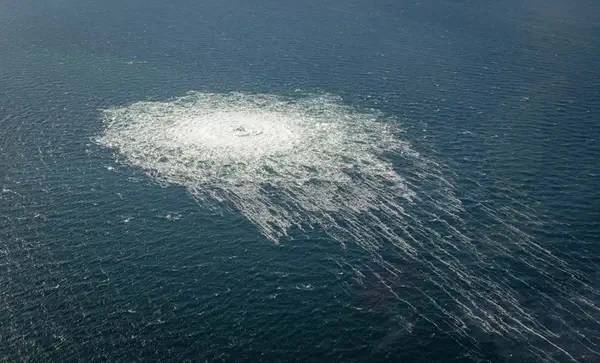
German insurers Allianz and Munich Re have renewed cover for the damaged Russia-controlled Nord Stream 1 gas pipeline, five sources with knowledge of the matter said, indicating that its revival has not been ruled out after an alleged sabotage attack.
Insurance by two of Germany's biggest companies is critical for any long-term future of the pipeline, which was the main route for Russian gas to Europe for a decade before the blast last September.
The insurance stands in contrast to Germany's public stance of severing ties with Moscow, but one of the five sources said the German government had not opposed the cover. Most Western investors have written off their stakes in the pipeline.
Munich Re, Allianz and Germany's chancellery declined to comment, while the economy ministry said insurance was not part of the support the government had in the past provided for the pipeline.
Russia has a 51% stake in Nord Stream 1 through a subsidiary of the state-owned energy group Gazprom.
Some of Nord Stream's German shareholders favor at least preserving the damaged pipeline in case relations with Moscow improve, two people familiar with the matter said separately.
One of the people said that Berlin tolerated such an approach to the infrastructure, even though it has said that energy ties with Russia are severed.
All of the insurance industry and trade sources declined to be named because of the sensitivity of the issue.
The insurance policy covers damage to the pipeline and business interruption issues, one of the sources said.
Having insurance would also facilitate any repair work needed to resume gas supplies under the Baltic Sea to Europe.
While the import of Russian crude oil and oil products is banned under European Union (EU) sanctions, Russian gas imports are allowed. The West, however, is trying to find alternatives.
'OLD LOGIC'
Europe's imports of Russian gas have fallen from around 40% of EU gas supply to less than 10% since Russia's invasion of Ukraine began in February last year.
The economy ministry spokesperson said the aim was to stop using gas from Russia and elsewhere.
"Russia showed everyone last year that it is not a reliable partner," said the spokesperson. "We need more renewable energies and must become independent of fossil imports."
The stance represents a major shift from Germany's previous whole-hearted support for Russian gas, in defiance of warnings from other EU countries and the United States.
Some German officials, politicians and others familiar with German government thinking told Reuters a minority still hoped Nord Stream 1 can be revived, even if few saw any prospect of that happening in the near future.
Michael Kretschmer, the conservative leader of the eastern Saxony region, told the Berliner Zeitung newspaper in January the pipeline should be repaired and Germany should retain the option of importing through it again.
Veronika Grimm, one of the government's chief economic experts who advises the chancellery, said Germany's previous policy of relying on cheap Russian gas to support its economy and build political ties was no longer viable.
"There are still some who follow an old logic with regards to rebuilding energy ties to Russia after the (Ukraine) war," Grimm told Reuters.
The economy ministry spokesperson said the Federal government in 2010 supported the construction of Nord Stream 1 with export credit guarantees and a separate financial credit guarantee, adding that there was no further federal support.
In September 2022, several unexplained underwater explosions ruptured the Nord Stream 1 and newly-built Nord Stream 2 pipelines, each more than 1,200-km-long, that link Russia and Germany across the Baltic Sea.
Last month, sources told Reuters Nord Stream's undersea gas pipelines were to be sealed and there were no immediate plans to repair or reactivate them.
Other sources described this process as keeping the pipeline dormant.
OTHER INSURERS
Prior to Russia's invasion of Ukraine last February, Nord Stream 1 was insured by multiple European underwriters including some from the Lloyd's of London market, sources told Reuters.
Industry sources with knowledge of the situation said some Lloyd's underwriters were believed to have cut insurance arrangements that came up for renewal in late 2022 in part because of UK sanctions imposed on an entity connected to Gazprom.
Three of the Lloyd’s syndicates previously involved in insurance cover were unlikely to have renewed their exposure, three of the insurance industry sources said.
However, a fourth source said its underwriting syndicate from the Lloyd's market continued to provide insurance for the project. They all declined to provide further details.
Lloyd's of London declined to comment.
Customers often renew insurance contracts when their property is damaged and this is taken into account when agreeing the contract terms, industry sources said.
Nord Stream 1's policy was a two-year contract which renewed after the first year, two of the sources said. However, policy-holders and insurers can often break such a contract after the first year, depending on the terms, two insurance industry sources said.
It was unclear if insurer Zurich was part of the new arrangements.
Zurich, which one of the five sources said was among the pipeline's insurers when the damage occurred, declined to comment.
Gazprom is subject to sanctions by Britain, Canada and the United States, as well as some EU restrictions.
Gazprom and Swiss-based Nord Stream AG did not immediately respond to requests for comment.
($1 = 0.9203 euros)
(Reuters - Reporting by Jonathan Saul and Carolyn Cohn in London, Tom Sims, Christoph Steitz and John O'Donnell in Frankfurt, additional reporting by Andreas Rinke and Markus Wacket in Berlin; Editing by Veronica Brown and Barbara Lewis)